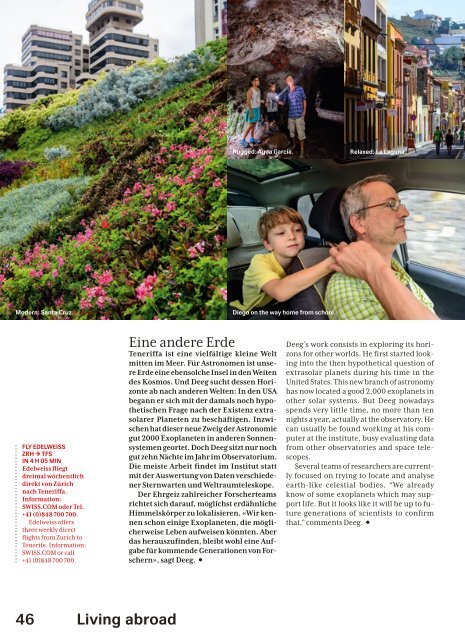SWISS Magazine November 2015
Create successful ePaper yourself
Turn your PDF publications into a flip-book with our unique Google optimized e-Paper software.
Rugged: Agua García.<br />
Relaxed: La Laguna.<br />
Modern: Santa Cruz.<br />
Diego on the way home from school.<br />
FLY EDELWEISS<br />
ZRH TFS<br />
IN 4 H 05 MIN<br />
Edelweiss fliegt<br />
dreimal wöchentlich<br />
direkt von Zürich<br />
nach Teneriffa.<br />
In for mation:<br />
<strong>SWISS</strong>.COM oder Tel.<br />
+41 (0)848 700 700.<br />
Edelweiss offers<br />
three weekly direct<br />
flights from Zurich to<br />
Tenerife. Information:<br />
<strong>SWISS</strong>.COM or call<br />
+41 (0)848 700 700.<br />
Eine andere Erde<br />
Teneriffa ist eine vielfältige kleine Welt<br />
mit ten im Meer. Für Astronomen ist unsere<br />
Erde eine ebensolche Insel in den Weiten<br />
des Kosmos. Und Deeg sucht dessen Horizonte<br />
ab nach anderen Welten: In den USA<br />
begann er sich mit der damals noch hypothetischen<br />
Frage nach der Existenz extrasolarer<br />
Planeten zu beschäftigen. Inzwischen<br />
hat dieser neue Zweig der Astronomie<br />
gut 2000 Exoplaneten in anderen Sonnensystemen<br />
geortet. Doch Deeg sitzt nur noch<br />
gut zehn Nächte im Jahr im Observatorium.<br />
Die meiste Arbeit findet im Institut statt<br />
mit der Auswertung von Daten verschiedener<br />
Sternwarten und Weltraumteleskope.<br />
Der Ehrgeiz zahlreicher Forscherteams<br />
richtet sich darauf, möglichst erdähnliche<br />
Himmelskörper zu lokalisieren. «Wir kennen<br />
schon einige Exoplaneten, die möglicherweise<br />
Leben aufweisen könnten. Aber<br />
das herauszufinden, bleibt wohl eine Aufgabe<br />
für kommende Generationen von Forschern»,<br />
sagt Deeg.<br />
·<br />
Deeg’s work consists in exploring its horizons<br />
for other worlds. He first started looking<br />
into the then hypothetical question of<br />
extrasolar planets during his time in the<br />
United States. This new branch of as tronomy<br />
has now located a good 2,000 exo planets in<br />
other solar systems. But Deeg nowadays<br />
spends very little time, no more than ten<br />
nights a year, actually at the observatory. He<br />
can usually be found working at his computer<br />
at the institute, busy evaluating data<br />
from other observatories and space telescopes.<br />
Several teams of researchers are currently<br />
focused on trying to locate and analyse<br />
earth-like celestial bodies. “We already<br />
know of some exoplanets which may support<br />
life. But it looks like it will be up to future<br />
generations of scientists to confirm<br />
that,” comments Deeg.<br />
·<br />
46 Living abroad


